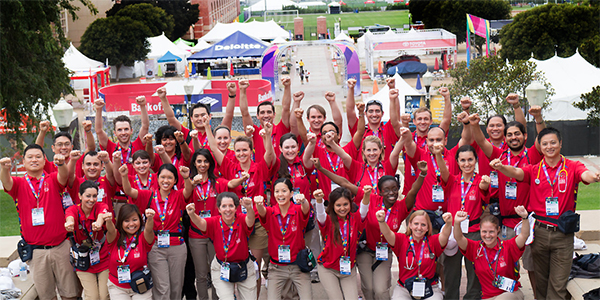The 2015 Special Olympics World Games included athletes from 165 countries with intellectual disabilities. The Games were held July 25 to Aug. 2, 2015, in Los Angeles.
Thirty-one members of the Loma Linda University family medicine department at Loma Linda University Health and affiliated Loma Linda – Inland Empire Consortium for Healthcare Education (LLIECHE) family medicine residency program volunteered July 31 as part of the team that responded to medical emergencies and medical needs of the athletes.
Stewart Wilkey, MD, a third-year family medicine resident at Loma Linda University Health, who often attends professional sporting events, including football and basketball games and championship events, recalls his experience. “I volunteered with the family medicine residents,” he recalls, “attending events on the UCLA campus. As the day progressed, we rotated through the various events, including volleyball, football (soccer), tennis, judo, gymnastics and softball.
“During a judo match, I watched a story unfold that I will never forget,” he says. “One of the athletes was nervous and unable to compete. With compassion, his opponent gave him a hug. The match paused until he calmed down and was able to compete.” Wilkey later called his brother. “I told him the World Games was the best sporting event I’d ever attended.”
The week prior to the Games (July 21 to 24), numerous Southern California towns hosted delegations from various countries.
Lauren Simon, MD, MPH, assistant program director, family medicine residency and director, primary care sports medicine, Loma Linda University, had met athletes from Austria and Liechtenstein while serving as “Host Town” team physician for the city of Redlands.
Simon orchestrated the participation of Loma Linda’s family medicine residency program in the World Games. According to Simon, everyone participated except those who were on duty in the hospital.
Prior to the Games, they received training on how to assess athletes with intellectual disabilities for the “three H’s” — heart, head and heat injuries, and other medical concerns that might be encountered.
Throughout the day the physicians input injury data on iPads and mobile phones into a specialized, secure injury data tracking program. Data collected from the various fields of play was transmitted electronically to a unified command center so that it could be reviewed in real time.
When necessary, the doctors stabilized athletes for transport to higher-level care. One physician also stabilized a spectator’s medical problem that occurred in the stands until emergency medical services (EMS) staff arrived.
Simon is fellowship trained in sports medicine, and used vacation time to volunteer at the Games prior to July 31. According to Simon, Special Olympics athletes may have physical challenges and other medical conditions in addition to their intellectual disabilities, such as limb spasticity (e.g., in some athletes with cerebral palsy), or seizure disorder, which can increase their risk of injuries. In addition, many of the athletes were tired from prolonged travel to get to Los Angeles from around the world.
More than 6,500 athletes from 165 countries participated in the Games. The family medicine residents assisted with numerous interventions, caring for a range of injuries from minor scrapes to broken bones, falls, bee stings and other medical and cardiopulmonary concerns.
“One of the added benefits that our family medicine residents and faculty provided to the athletes was their multi-lingual skills,” says Simon, “with many languages spoken among our group. This talent enabled them to speak with many of the athletes in their own native language.”
Julia Shayunussova, MD, a family practice resident, says, “It was an unexpected and exciting surprise to find out that there was a big delegation at the Games from my country, Kazakhstan. It was an overwhelming, exciting experience as I met the great special athletes and their coaches. I wouldn’t have been able to meet them if it wasn’t for Dr. Simon’s work to get us there. I'm thankful to Loma Linda University, the family medicine residency program, and especially Dr. Simon!”
“It was saddening to learn statistics that many intellectually disabled individuals often do not receive adequate medical care,” says Simon. “This was highlighted during an ESPN feature about the Special Olympics by reporter Robin Roberts. As our medical residents provided care at the World Games, they gained skills and a deeper understanding of treating athletes and others with intellectual disabilities that they can continue to implement in their own practices.”
Simon is inspired by the teamwork she witnessed and the inspirational moments and sportsmanship seen in the Games with athletes and dedicated volunteers. “There was an amazing spirit of volunteerism,” she says. “Many of the residents approached me during and after the event and said that it was such a great experience that they want to do it again. As this takes place during their practices later on, it will continue to fulfill the mission of Loma Linda University Health ‘to continue the teaching and healing ministry of Jesus Christ.’”
Simon is grateful to Richard Hart, MD, DrPH, president, Loma Linda University Health, and Nancy Young, president and CEO of Social Action Community Health System (SAC Health System) in San Bernardino, for their support. SAC clinics were closed July 31 so that the residents could volunteer.
Family medicine residency program residents, core faculty and some family members attended the Games. The event was the largest sports and humanitarian event held globally in 2015, and was the biggest event in Los Angeles since the 1984 Olympic Games.
According to Simon, at Loma Linda University Health, residents have other opportunities to provide global medical care. There are two family practice residency programs: a traditional three-year family residency program and a four-year combined family/preventive medicine residency. Residents in the traditional and combined programs have worked in the Congo, China, Nepal, Honduras and Malawi during or after they have completed the program.

